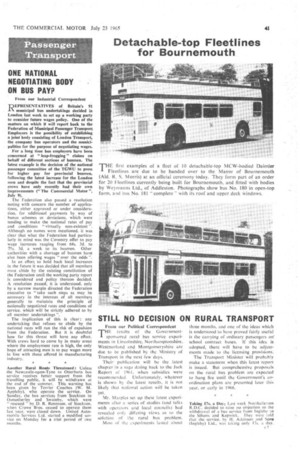ONE NATIONAL NEGOTIATING BODY ON BUS PAYP
Page 43

If you've noticed an error in this article please click here to report it so we can fix it.
Front our Industrial Correspondent
REPRESENTAT1VES of Britain's 91 municipal bus undertakings decided in London last week to set up a working party to consider future wages policy. One of the matters on which it will report back to the Federation of Municipal Passenger Transport Employers is the possibility, of establishing a joint body consisting of London Transport, the company bus operators and the municipalities for the purpose of negotiating wages.
For a long time bus employers have been concerned at "leap-frogging" claims on behalf of different sections of busmen. The latest example is the decision of the national passenger committee of the TGWU to press for higher pay for provincial busmen, following the latest increase for the London men and despite the fact that the provincial crews have only recently had their own improvements (" The Commercial Motor ", July 9).
The Federation also passed a resolution noting with concern the number of applications, either approved or under consideration, for additional payments by way of bonus schemes or deviations, which were tending to make the national rates of pay and conditions "virtually non-existent ". Although no names were mentioned, it was clear that what the Federation had particularly in mind was the Coventry offer to pay wage increases ranging from 64s. 3d. to 75s. 3d. a week to its busmen. Other authorities with a shortage of busmen have also been offering wages over the odds".
In an effort to hold back local increases in the future it was decided that all members must abide by the existing constitution of the Federation until the working party report is considered and policy thereon decided. A resolution passed, it is understood, only by a narrow margin directed the Federation executive to "take such steps as may be necessary in the interests of all members generally to maintain the principle of nationally negotiated rates and conditions of service, which will be strictly adhered to by all member undertakings ".
The implication of this is clear: any undertaking that refuses to abide by the national rates will run the risk of expulsion from the Federation. But it is doubtful how far this threat will have any effect. With crews hard to come by in many areas where the employment rate is high, the only hope of attracting men is to pay wages more in line with those offered in manufacturing industry.




























































































































